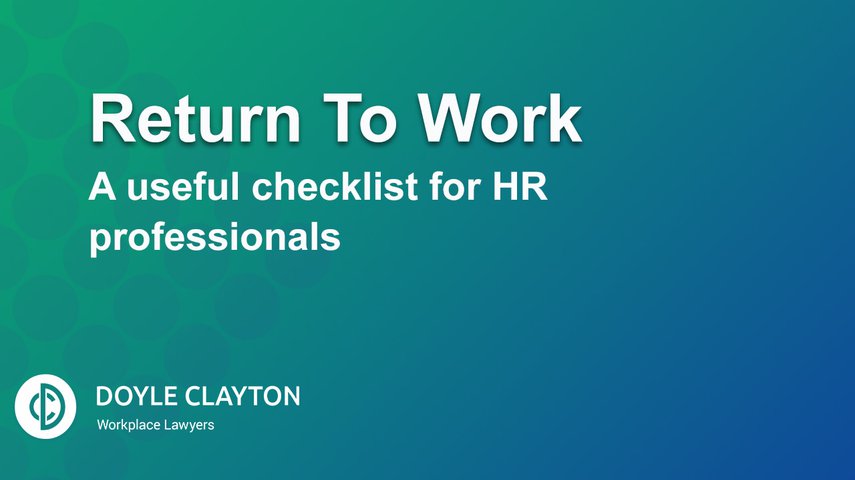Return to Work Checklist

Flexible working and life 'after' COVID
As organisations increasingly return to office-based working, HR professionals are at the forefront. What's the best way to respond to flexible working requests? Do you intend to require employees to work (partly) from home? What are the practical issues hybrid-working creates? What can you do to reduce the risk of mental health issues that can arise from extended periods of working from home?
Following our recent webinar on employee expectations when returning to the workplace we've produced this handy checklist. It will be useful for HR and management grappling with these issues and help them to make the transition as smooth a process as possible.
Preparation for Flexible Working
- Are you going to require employees to submit formal flexible working requests or are you going to implement a discretionary policy?
- Consider which roles are appropriate for flexible working. Are there any roles that are unsuitable for home-working in the future? List and keep a record of the business reasons (along with supporting evidence) for arriving at this conclusion.
- If you are making changes to work location, have you reviewed your employment contracts to check what they say? Changes may need to be agreed.
- Revisit your Employee Handbook and individual polices to ensure they cover the key issues that may arise. Do you have up to date and suitable home-working, IT, data protection, business travel, expenses and health and safety policies which are consistent with one another?
- Do all staff understand their obligation to maintain confidentiality of company information, for example when travelling and taking calls in a public space.
- Have you conducted a full risk assessment of working areas (both in the workplace and the home)? Do these need to be refreshed?
Dealing with Flexible Working Requests
- Have you communicated effectively with the staff about the options for working patterns of any relevant co-workers?
- Have you communicated the practical arrangements for returning to the office? Do staff need to renew their security pass or be aware of any new arrangements in their office building?
- If you required employees to submit a formal flexible working request, have you followed your flexible working policy correctly? Remember you can only refuse a request on one of the statutory grounds.
- Have you issued side letter or updated contracts to reflect any revised working arrangements? Does the documentation cover all the key points, including the conditions of home-working? For example, does your policy deal with the issue of simultaneous care responsibilities, the need for a stable WIIF connection at home and keeping confidential information secure?
- Have you implemented trial periods for flexible working arrangements? Have managers been trained to assess effectively how any new arrangements are working during those trial periods?
- Will the salary of the staff be affected by any of the new working arrangements? If you propose to reduce any salaries, have the proper processes been implemented and considerations given to collective consultation obligations, if relevant?
Practicalities of Home Working
- Have you checked your insurance policies (such as employer's liability, public liability, company equipment in the home/while travelling) to ensure that appropriate cover is provided in light of the new arrangements?
- Will you be providing equipment to staff working from home? Who will bear the cost of this and has it been factored into the appropriate internal budgets? Will any personal use be permitted (this may have tax consequences?)
- Who is responsible for any damage to company equipment and is this reflected in a policy?
- Does the business have a policy on contributing towards household costs for home-working staff such as heating/lighting/internet etc. Many staff are asking this questions and the business should be ready with a consistent answer. Not there is no obligation on employers to make a contribution. In some cases, employees may be able to claim a deduction against tax on their individual tax return for the cost of certain additional household expenses.
- Do staff know how to access IT support from home if required?
- Consider whether the benefits package for staff is still appropriate? For example, membership at a gym near the office may not be worthwhile if the employee is moving to full-time home-working.
- Are any staff members proposing to work overseas? Has the business considered the associated risks and taken local legal and tax advice as appropriate?
- Is your workspace an appropriate size for the number of staff who will be working at any given time? Could the business consider upsizing or downsizing accordingly?
- If staff will be 'hot desking', have you considered whether its appropriate to provide additional cupboards/lockers? Have you explained to staff how the desk allocation will work?
Staff Wellbeing
- Will managers be expected to conduct regular team meetings in the future? Which day will you have the meeting on and how does this affect any staff who are working from home?
- How will managers be expected to deal with supervision and appraisals and have they recieved appropriate training?
- How have you ensured that there are open channels of communication within the business so that staff can raise their concerns (and ideas)? Does the business need any additional software to facilitate this?
- Have you remind staff and managers about the importance of taking breaks and ensuring clear boundaries between work life and home life?
- Have you considered how staff with mental health issues will adapt to the new way of working and what additional support they may need from their managers? Do you offer your staff an Employee Assistance Programme or is there any other support that you could offer them while they adjust?
- Will you conduct any social gatherings to boost team morale?
- Will there be a way of checking in with home working staff on a regular basis so that any mental health, performance or AWOL issues are identified swiftly?
Watch our webinar which looks at how employers are adapting their workplaces in response to wellbeing concerns during the COVID-19 pandemic
Be Ready for Anything
- Have you considered where there may be areas of high risk for certain staff such as disabled individuals? Have you considered how the new working arrangements affect them? Have you considered how to reduce these risks? For example, if a disabled employee requires reasonable adjustments in the office, have these been replicated at home?
- Many employees are expressing concerns about the risk of travelling on public transport in to work. You may wish to consider how these are dealt with and whether offering some flexibility around start and finish times to avoid rush hour may be a sensible compromise.
- Look out for any staff who are disgruntled about any aspect of the new arrangements (or other staff members' attitudes towards the pandemic vaccination or controlling the spread of the virus) and consider whether they may raise a grievance. Is there anything you or a manager can do to allay their concerns?
- Staff may need to take time off to have vaccinations and possibly sick leave afterwards if they experience side effects. Ensure that staff are supported and managers are ready for this and able to arrange cover as required.
To download the checklist, please click here.
If you have any questions about returning to work, please get in touch with your usual Doyle Clayton contact or email info@doyleclayton.co.uk and one of our team will be pleased to help.
The articles published on this website, current at the date of publication, are for reference purposes only. They do not constitute legal advice and should not be relied upon as such. Specific legal advice about your own circumstances should always be sought separately before taking any action.

